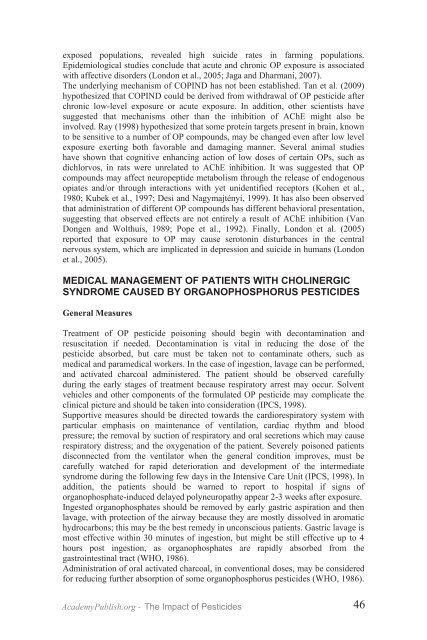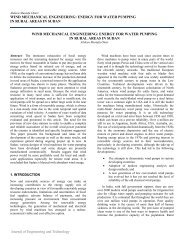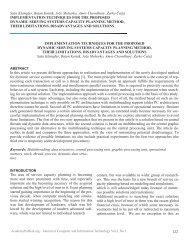- Page 1 and 2: The Impactof PesticidesEdited by:Pr
- Page 3 and 4: Other access free resources from Ac
- Page 5 and 6: The Impact of PesticidesPrepared an
- Page 7 and 8: Table of Contentsp.203-p.224 Behavi
- Page 9 and 10: About authorspublished by Elsevier.
- Page 11 and 12: About authorsof medical researchers
- Page 13: About authorsdifferent spatial scal
- Page 16 and 17: About authorsEducation:Bachelor’s
- Page 18 and 19: About authorsSensors - A Nanotechno
- Page 20 and 21: Section 1HUMAN EXPOSURE TO PESTICID
- Page 22 and 23: ecently explored on preliminary stu
- Page 24: individuals within 1 day (Jokanovic
- Page 27 and 28: occupational environmental health r
- Page 30 and 31: must be considered, since effective
- Page 34 and 35: Jensen BH, Petersen A, and Christen
- Page 36 and 37: Ragas AMJ, and Huijbregts MAJ (1998
- Page 38 and 39: Weichenthal S, Moase C, and Chan P
- Page 40 and 41: human poisoning, general acute symp
- Page 42 and 43: Management of the cholinergic syndr
- Page 44 and 45: 1982; Lotti, 1992; Jokanović et al
- Page 48 and 49: DiazepamBenzodiazepines are CNS dep
- Page 50 and 51: Among the many classes of oximes in
- Page 52 and 53: inhibited by dichlorvos (a dimethox
- Page 54 and 55: Dawson, 1995). It appears that the
- Page 56 and 57: Eddleston M, Eyer P, Worek F, Moham
- Page 58 and 59: Jokanović M, Kosanović M (2010b).
- Page 60 and 61: Ray DE (1998). Chronic effects of l
- Page 62 and 63: Worek F, Eyer P, Kiderlen D, Thierm
- Page 64 and 65: developing countries is due to suic
- Page 66 and 67: count and morphology, as well as se
- Page 68 and 69: PON1 modulation of genetic damageFe
- Page 70 and 71: elationship between OP exposure and
- Page 72 and 73: Blatter-Garin MC, James RW, Dussoix
- Page 74 and 75: Hung RJ, Hall J, Brennan P, Boffett
- Page 76 and 77: Rojas-García AE., Solís-Heredia M
- Page 78 and 79: Occupational Exposure to Pesticides
- Page 80 and 81: considered as conditions typical of
- Page 82 and 83: observed adverse health outcome. Su
- Page 84 and 85: within cells can oxidize biomolecul
- Page 86 and 87: of the study. A face-to-face questi
- Page 88 and 89: PesticidesFungicideInsecticide-Nema
- Page 90 and 91: Table 4. Mixtures of pesticides use
- Page 92 and 93: In pesticide applicators, Table 7 s
- Page 94 and 95: DISCUSSIONThe agricultural workers
- Page 96 and 97:
changes in the antioxidant enzyme C
- Page 98 and 99:
Bajpayee, M.; Pandey, A. K.; Parmar
- Page 100 and 101:
Environmental health criteria 155.
- Page 102 and 103:
Palus, J.; Rydzynski, K.; Dziubalto
- Page 104 and 105:
Singh, N.P.; McCoy, M.T.; Tice, R.R
- Page 106 and 107:
INTRODUCTIONPopulations may be occu
- Page 108 and 109:
exposure scenarios on the basis of
- Page 110 and 111:
not present adverse health effects
- Page 112 and 113:
greenhouse workers exposed to malat
- Page 114 and 115:
Paraoxon is then either metabolized
- Page 116 and 117:
cyclohexene-1,2-dicarboximide, CAS
- Page 118 and 119:
metabolite of phthalates, such that
- Page 120 and 121:
scenarios were simulated, assuming
- Page 122 and 123:
Table 2. Biological reference value
- Page 124 and 125:
References N a urinarybiomarkeStudi
- Page 126 and 127:
Figure 2. Representation of a BRV d
- Page 128 and 129:
Figure 4. Conceptual representation
- Page 130 and 131:
Figure 6 Conceptual representation
- Page 132 and 133:
REFERENCESACGIH, 2011. Documentatio
- Page 134 and 135:
Bradway, D.E., Shafik, T.M., 1977.
- Page 136 and 137:
EPA, 1999b. Registration Eligibilit
- Page 138 and 139:
Hines, C.J., Deddens, J.A., Jaycox,
- Page 140 and 141:
McCollister, S.B., Kociba, R.J., Hu
- Page 142 and 143:
Verberk, M.M., Brouwer, D.H., Brouw
- Page 144 and 145:
important IGFBP for binding IGF-1 i
- Page 146 and 147:
secretion of IGF-1 (Tannheimer et a
- Page 148 and 149:
FIGURESFig. 1. An “hormetic” ef
- Page 150 and 151:
Landi F, Capoluongo E, Russo A, Ond
- Page 152 and 153:
Smith WJ, Underwood LE, Clemmons DR
- Page 154 and 155:
Section 2PESTICIDES IN THEENVIRONME
- Page 156 and 157:
vicinity of subsoil waters and ther
- Page 158 and 159:
Hieracium pilosella, southernwood -
- Page 160 and 161:
formed clusters (Figure 3). Ultrast
- Page 162 and 163:
Fig. 5. Fragment of hepatocyte of t
- Page 164 and 165:
Szarek, J, Skibniewska, K, Wojtacka
- Page 166 and 167:
negative effects (ZALUCKI et al., 2
- Page 168 and 169:
Figure 2. Appropriated sampling pro
- Page 170 and 171:
Figure 4. Illustration of the conse
- Page 172 and 173:
(HAILE et al., 1998). Earlier resul
- Page 174 and 175:
Table 1. Distribution of the applic
- Page 176 and 177:
Means followed by the same letter i
- Page 178 and 179:
(involving pests and natural enemie
- Page 180 and 181:
efore the pest emergence and their
- Page 182 and 183:
Table 3 (continuation)…AcademyPub
- Page 184 and 185:
Table 5. Effect of different fungic
- Page 186 and 187:
Table 6. Magament used including do
- Page 188 and 189:
adopted by Brazilian soybean grower
- Page 190 and 191:
Pickle, C.S.; Caviness, C.E. Yield
- Page 192 and 193:
This chapter reports on Dutch surfa
- Page 194 and 195:
several different occasions at any
- Page 196 and 197:
The greatest number of pesticides a
- Page 198 and 199:
Accumulated ExceedanceIt is useful
- Page 200 and 201:
For the years 2003-2009 the calcula
- Page 202 and 203:
Bonzini S, Verro R, Otto S, Lazzaro
- Page 204 and 205:
atios of the pesticide amounts in t
- Page 206 and 207:
Table 1. (Cont.) Runoff ratios of p
- Page 208 and 209:
mefenacet and simetrin were observe
- Page 210 and 211:
Table 2. (Cont.)Pesticide concentra
- Page 212 and 213:
Table 2. (Cont.)Pesticide concentra
- Page 214 and 215:
Fig. 3. Typical weekly variation of
- Page 216 and 217:
(BAM) in water (Pukkila et al. 2009
- Page 218 and 219:
Table 5. Concentrations of pesticid
- Page 220 and 221:
Table 6. Maximum concentrations of
- Page 222 and 223:
Iwafune, T, Inao, K, Horio, T, Iwas
- Page 224 and 225:
Suzuki, M, Takemine, S, Yoshida, M,
- Page 226 and 227:
factor, etc. Levels of pesticides i
- Page 228 and 229:
factor of 10 above ambient sea wate
- Page 230 and 231:
weight sample. Minimum were shown f
- Page 232 and 233:
Figure 3. DDTs in mussel samples fo
- Page 234 and 235:
Figure 5. HCB in mussel samples for
- Page 236 and 237:
Figure 8. Methoxychlor in mussel sa
- Page 238 and 239:
ACKNOWLEDGEMENTAuthors thank UNEP/M
- Page 240 and 241:
Pesticide Risk Index of Del Azul Wa
- Page 242 and 243:
on that presented in Swanson et al.
- Page 244 and 245:
eference value for that substance.
- Page 246 and 247:
predict the aquatic toxicity of a s
- Page 248 and 249:
Calculation Model of Aggravating Fa
- Page 250 and 251:
To estimate the values of Human Hea
- Page 252 and 253:
water in comparison with the durati
- Page 254 and 255:
Cypermethrin (95 th percentile (P 9
- Page 256 and 257:
Table 8 shows the results of the De
- Page 258 and 259:
are many ranking systems of dangero
- Page 260 and 261:
REFERENCESAres J. (2004). “Estima
- Page 262 and 263:
Mackay D. and Paterson S. (1991).
- Page 264 and 265:
Long-term Monitoring of Pesticides
- Page 266 and 267:
Sampling sites of the survey in 200
- Page 268 and 269:
than those in Lake Biwa and Seta Ri
- Page 270 and 271:
Fig. 7 Detection of fungicides in R
- Page 272 and 273:
Fig. 11 Detection of herbicides in
- Page 274 and 275:
Monitoring of pesticides in Yanamun
- Page 276 and 277:
A measured volume (1000 mL) of the
- Page 278 and 279:
SimetrynePretilachlorConcentration
- Page 280 and 281:
Fig. 18 Maximum concentrations of t
- Page 282 and 283:
Ecological risk assessmentFig. 20 Y
- Page 284 and 285:
REFERENCESAgradi E, Baga R, Cillo F
- Page 286 and 287:
Time Trend Variation of Selected Pe
- Page 288 and 289:
Table 1. Physical and chemical prop
- Page 290 and 291:
marketed under variety of trade nam
- Page 292 and 293:
Figure 3. Long-term trends of globa
- Page 294 and 295:
laboratory animals fed or injected
- Page 296 and 297:
fed for a lifespan at 5-1,600 mg/kg
- Page 298 and 299:
Soil samplingSoil sampling was foll
- Page 300 and 301:
Figure 5. Map showing sampling area
- Page 302 and 303:
concentration (MAC) in surface soil
- Page 304 and 305:
Table 7. Concentrations of HCH isom
- Page 306 and 307:
Shanghai and Guanting Reservoir (Ch
- Page 308 and 309:
Contrary to the results of ΣDDT, t
- Page 310 and 311:
DDT metabolites, the ratio of (p,p
- Page 312 and 313:
2001). Therefore, the predominance
- Page 314 and 315:
Mean concentration (ng g -1 dw)3002
- Page 316 and 317:
CONCLUSIONSAn evaluation of selecte
- Page 318 and 319:
Hung, D.Q., Thiemann, W., (2002),
- Page 320 and 321:
Viet, P.H., Hoai, P.M., Minh, N.H.,
- Page 322 and 323:
found in tissues or fluids samples
- Page 324 and 325:
Study area and SamplingThis study w
- Page 326 and 327:
the liver, mainly to p,p'-DDE and p
- Page 328 and 329:
33,370 ha, whilst that of woody cro
- Page 330 and 331:
Increase in crops area (x1000)Ha)25
- Page 332 and 333:
Table 1. Blood concentrations of or
- Page 334 and 335:
Council Directive 90/533/EEC of 15
- Page 336 and 337:
Konstantinou, IK, Goutner, V, Alban
- Page 338 and 339:
Smith, AG (2004). “Toxicology of
- Page 340 and 341:
Pesticides are used in order to pro
- Page 342 and 343:
EXPERIMENTALMaterialsIsoproturon wa
- Page 344 and 345:
RESULTS AND DISCUSIONEquilibrium is
- Page 346 and 347:
As seen in Table 4, as the concentr
- Page 348 and 349:
Fig.4. Breakthrough curves of isopr
- Page 350 and 351:
Fig.6. Breakthrough curves of isopr
- Page 352 and 353:
Fig.8. Experimental and theoretical
- Page 354 and 355:
Section 3PESTICIDE ANALYSISAcademyP
- Page 356 and 357:
scandal’ are familiar to the gene
- Page 358 and 359:
ecoveries (>70%) for certain pH-dep
- Page 360 and 361:
Due the versatility of the QuEChERS
- Page 362 and 363:
of application, with some still sca
- Page 364 and 365:
The main supercritical solvent used
- Page 366 and 367:
extracting the pesticides from the
- Page 368 and 369:
would be appropriate for the routin
- Page 370 and 371:
chromatography with negative-ion el
- Page 372 and 373:
GPC was applied as a nondestructive
- Page 374 and 375:
Charlton A.J.A., Stuckey, V. (2009)
- Page 376 and 377:
Lehotay, S.J., Mastvoska, K. & Yun,
- Page 378 and 379:
Rodrigues, F. M., Mesquita, P. R. R
- Page 380 and 381:
Analytical methods to assess the im
- Page 382 and 383:
acetylcholine, a neurotransmitter t
- Page 384 and 385:
1.3 to 22.3% for all pesticides. Li
- Page 386 and 387:
Malathion, parathion, fenitrothion,
- Page 388 and 389:
Fuller, BH and Berger, GMB (1990).
- Page 390 and 391:
Table 1. Largest exporters of coffe
- Page 392 and 393:
Fig. 1: Structures of (a) Phosphate
- Page 394 and 395:
ELECTROCHEMICAL BIOSENSORBiosensors
- Page 396 and 397:
inorganic and organic species a lar
- Page 398 and 399:
surface area and be easily modified
- Page 400 and 401:
Acetylcholine + H 2 O AChE Choline
- Page 402 and 403:
Wang, 2010) and tetracyanoquinodime
- Page 404 and 405:
PDDA/AChE/PDDA/CNT/GCAChE-Au-PPy/GC
- Page 406 and 407:
ng/mL and good precision (RSD ) 5.3
- Page 408 and 409:
FUTURE PERSPECTIVESThe detection of
- Page 410 and 411:
Du, D; Wang, M; Cai, J; Qin, Y; Zha
- Page 412 and 413:
Martorell, D; Cespedes, F; Fabreaga
- Page 414 and 415:
The Pesticide Action Network (PAN).
- Page 416 and 417:
About EditorMilan JokanovićProfess
- Page 418:
THE IMPACT OF PESTICIDESPesticides












